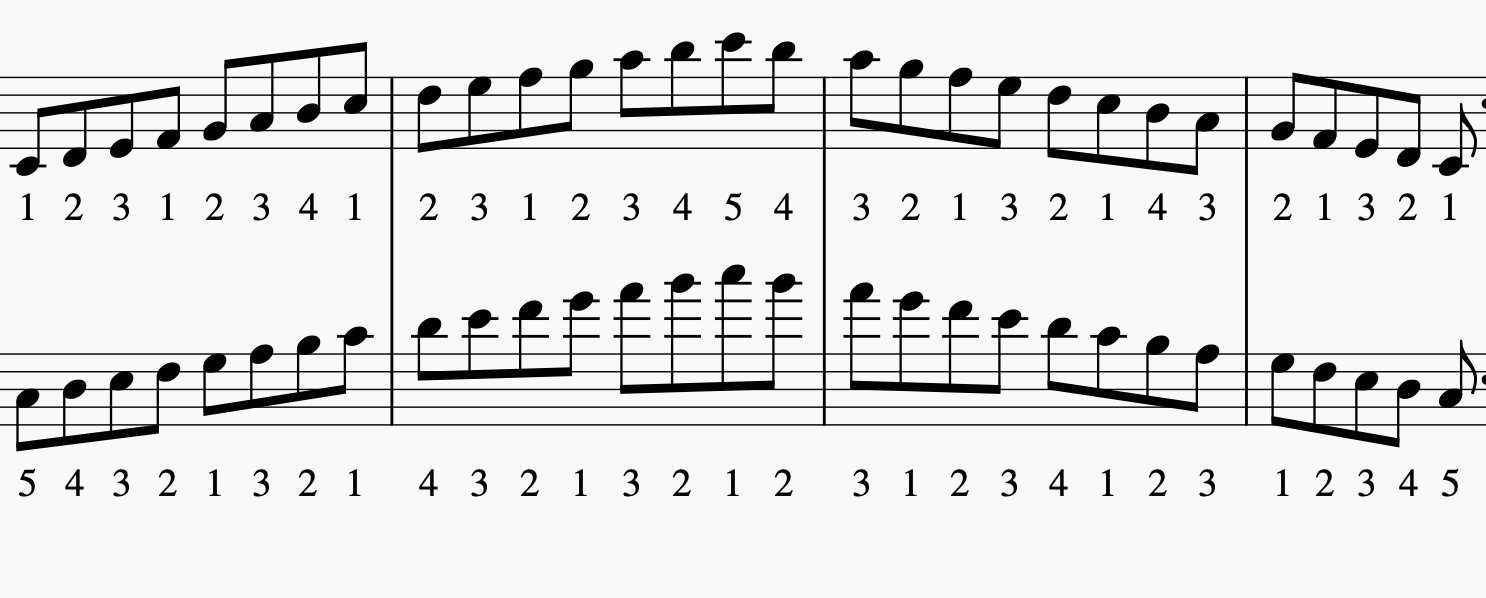6 Piano Skills
If you have no experience with piano, you are strongly encouraged to get started with private study as soon as possible! This skill cannot be emphasized enough. If you are a choral director, you will not always have a full-time accompanist in your school music program for rehearsals. As a choir director there will be multiple occasions in which you will need to be able to help your students one-on-one in which piano skills are indispensable. Everyone may need to be able to accompany simple solos at contest.
Before entering a degree program, make it your goal to, at the minimum, be able to read a simple melody with one hand. Find some beginner level piano books and practice reading at sight. Hymnals are another great resource. Accompany your right-hand melody with your left hand using I, IV, and V chords (included in this chapter). This will help you be able to “fake it until you make it!”
Piano Proficiency
It is common to be required to take four semesters of class piano (sometimes more) and/or pass a piano proficiency test. If you already have some piano skills, you may be able to opt to take private piano lessons, but these will likely be at an additional cost (which is money well spent!). You may also be able to take the proficiency exam early.
In case you didn’t already catch it, a wide variety of musical activities—in the classroom, rehearsal, private lesson or in performance—involve the piano—especially if you are a choral director or elementary music teacher. It is important that you have some working knowledge of this indispensable teaching tool. It is impossible to practice piano too much! There are several You Tube videos on how to play songs and online piano instruction and apps, but nothing beats a weekly lesson with a qualified teacher.
Already have the skills?
Do you already have decent piano skills? Once you are in college, you can continue to develop them by becoming a collaborative pianist (accompanist). At some schools you can accompany for voice class, seminars, choir rehearsals, or friends’ recitals. This can also be great way to earn money (it certainly beats working in the cafeteria!)
The Proficiency Test
Solos
Perform two memorized, contrasting pieces at the appropriate level.
Scales
Prepare two octave scales in all major and minor (both harmonic and melodic) keys, with the correct standard fingering, observing good hand position and maintaining a steady tempo (80 b.p.m., or beats per minute). Here is a C major scale with fingerings. All 12 major and minor scales can be found on the Oktav site (see link at the end of the chapter).
Sightreading
Play (without prior practice) a short piece in a key signature of up to two sharps or two flats. There is also often a requirement to sightread a choral open score, a four-part church hymn, or a condensed score for band/orchestra.
Chords
Prepare the primary chords of I, IV and V in all major and minor keys. Here they are in the Key of C:
|
|
|
|
Melody
Sightread a given treble-clef melody (as may be found in an elementary music textbook), and then harmonize it with LH chords.
Transposition
Transpose a melody and its chordal accompaniment into a different key. (All intervals stay the same and the melody sounds the same, but begins on a higher or lower pitch.)
Harmonization
Provide a left-hand accompaniment to a familiar tune. Think tunes like Amazing Grace, Old MacDonald, Happy Birthday, or You Are My Sunshine. Can you sing or hum these melodies and figure out which chord to use? (All can be done with only I, IV and V—with roots of do, fa, and sol, respectively.) Then, play the melody in the right hand while playing the left-hand accompaniment. You can find loads of lists of two-and three-chord songs online (see Chord Genome below).
Additional Resources
Beth’s Notes: Songs with Chords I, IV, V. https://www.bethsnotesplus.com/2017/04/songs-chords-iv-v.html.
Chord Genome. https://www.chordgenome.com/search-common-chord-progressions/.
Find thousands of songs that use common chord progressions.
Chuku Onyemachi. How To Play The 1-4-5 Chord Progression In All Twelve Major Keys. https://gospel.hearandplay.com/main/how-to-play-the-1-4-5-chord-progression-in-all-twelve-major-keys/.
OKTAV. All Major and Minor Scales. https://stories.oktav.com/en/s/major-and-minor-scales.







